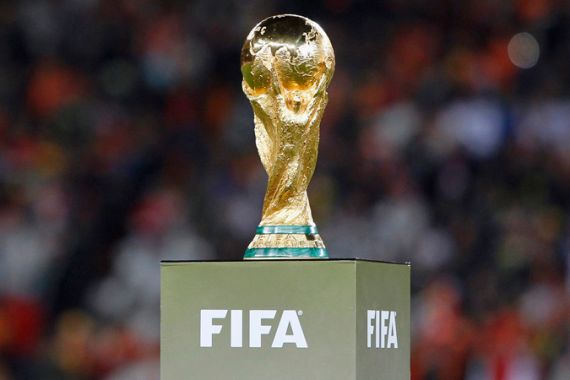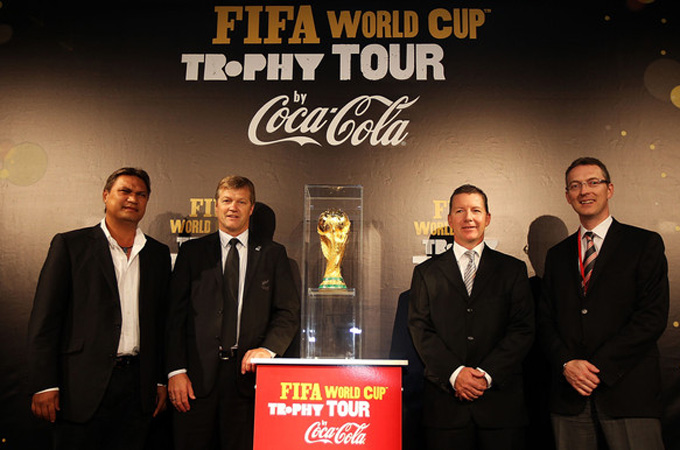World Cup bribery claims probed
Fifa investigates two members who allegedly offered to sell their votes in support of a country bidding for 2018 event.

 |
|
Temarii, far left, has been accused of offering to sell his 2018 World Cup vote for $2.3m [GALLO/GETTY] |
Fifa, football’s world governing body, has launched an investigation into British newspaper allegations that two members of its executive committee offered to sell their votes in support a country bidding to host the 2018 World Cup.
Reynald Temarii, a French Fifa vice-president, and Amos Adamu, a Nigerian member of the federation’s committee, reportedly told Sunday Times journalists posing as lobbyists that they would endorse their country’s bid in return for large sums of money.
Adamu was apparently caught on camera meeting with reporters pretending to be working for the United States, in which he offered a “guarantee” to vote for the US bid in the 2018 event in return for $800,000 for a personal project.
According to the newspaper, Adamu, who is the president of the West African Football Union, said the money he requested was intended to pay for four football stadiums in Nigeria, but asked that it be paid to him personally.
“Certainly, if you are to invest that, that means you also want the vote,” he was reported as saying.
Adamu said that the payments should be in two stages, half now and half after the vote on who will be the World Cup’s host country on December 2.
The newspaper also reported that Adamu had agreed with another nation to back their bid in the 2022 World Cup contest, which will also be decided on December 2, but said that the US would be his second preference.
‘Have to pay people’
Jonathan Calvert, editor of Insight, the Sunday Times investigative unit which broke the story, told Al Jazeera that it was surprisingly easy to buy Fifa votes.
“We were quite astonished by the fact that we could travel around and meet various people who held senior positions in Fifa in the past and [who] held senior positions in Fifa now … who were all advocating that to seal votes for the World Cup … we would have to pay people.
“We have quite a lot of material, some of which we will be publishing next week,” Calvert said.
“A lot of people did tell us about offers that have been made for huge amounts of money … a $1m, for votes, which could be used personally … we also talked to people who received offers for incredible amounts of money, up to $12m [as] one person told us.”
In a separate incident, the Sunday Times said that Temarii, who is also a president of the Oceania Football Confederation, had asked for $2.3m to build a sports academy.
It was also reported that he boasted that supporters of two bid committees had already offered Oceania money to swing his vote.
Such deals are strictly forbidden under Fifa’s regulations, but the newspaper said six senior Fifa officials, past and present, had told the undercover reporters that paying bribes offered their best chance at securing their bid.
“Fifa has already requested to receive all of the information and documents related to this matter [the Sunday Times report], and is awaiting to receive this material,” Fifa said in a statement on Sunday.
“In any case, Fifa will immediately analyse the material available and only once this analysis has concluded will Fifa be able to decide on any potential next steps.”
‘Negative impact on Fifa’
Meanwhile, Sepp Blatter, Fifa’s president, said on Sunday that claims of alleged vote-selling by two executive committee members ahead of the decision on the 2018 and 2022 World Cup hosts, had created “a very negative impact” on soccer’s governing body.
In an open letter to the executive committee, published on Fifa’s website, Blatter said: “I am sorry to have to inform you of a very unpleasant situation which has developed in relation to an article published today in the Sunday Times, entitled ‘World Cup votes for sale’.
“The information in the article has created a very negative impact on Fifa and on the bidding process for the 2018 and 2022 World Cups.”
Keir Radnenge, a columnist for World Soccer magazine, told Al Jazeera the circumstances of the bidding process left Fifa vulnerable to corruption.
“I think Fifa made a [risky decision] initially when it decided that it would actually award the hosting of two World Cups simultaneously,” said Radnenge.
“I think that really opened the door to a vast extra unnecessary amount of politicking, persuading, dealing, and speculating.
“I think what this does now with the present bidding situation is it compromises to a huge degree the two people who have been named and comprises the way Fifa will reach its decisions.”
The Sunday Times reported that the countries bidding for the 2018 and 2022 tournaments had denied any wrongdoing.